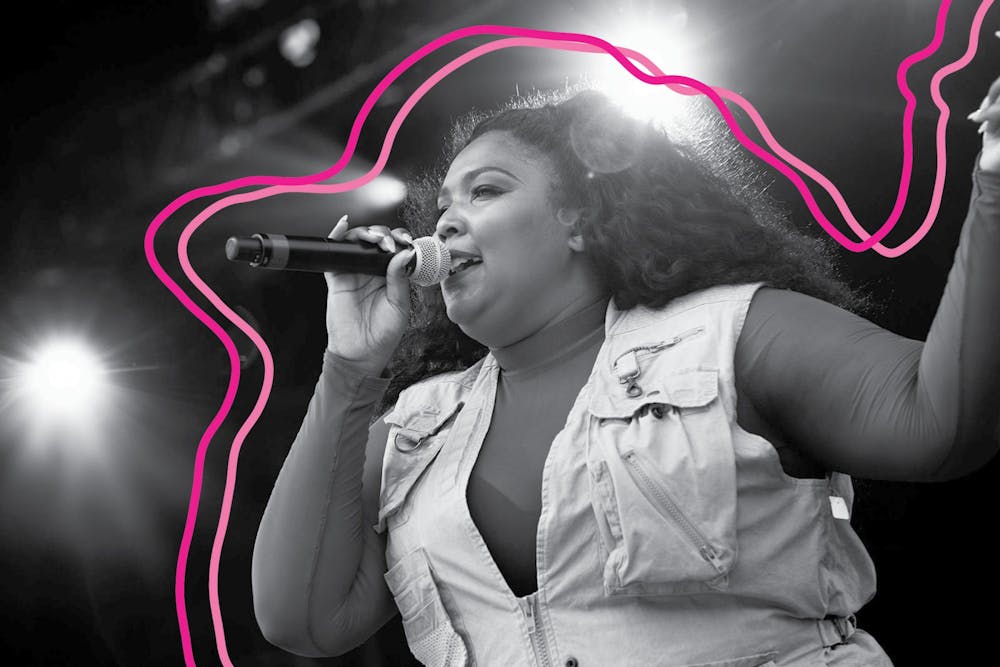Melissa Jefferson, known more commonly as Lizzo, is a three–time Grammy award–winning artist, a talented singer/songwriter, a skilled flutist, and an outspoken advocate for body neutrality. Given all of her accomplishments—her body is the least interesting thing about her. So why can’t people stop talking about it?
With the release of her latest single “Rumors” featuring rapper Cardi B, Lizzo yet again faced a wave of hateful comments about not only her weight, but also her supposed perpetuation of the “Mammy” stereotype. “Rumors” sports a defiant message of confidence alongside a funky beat and Hercules–inspired music video, but ultimately became a self–fulfilling prophecy with lyrics like, “Sick of rumors / But haters do what they do / Haters do what they do.”
Inundated by waves of unwarranted criticism about her figure, sexuality, and race, Lizzo called out the negative comments on Instagram Live, stating “What I won’t accept is y’all doing this to Black women ... especially us big Black girls. When we don’t fit into the box that you want to put us in, you just unleash hatred onto us.”
Lizzo’s observation is upsettingly supported by her public reception over the past few years. When Lizzo wears revealing outfits similar to those of other pop stars like Ariana Grande and Taylor Swift, she’s met uniquely with scathing criticism. She puts it best herself in “Rumors” with, “They say I should watch the shit I post, oh, goddamn / Say I’m turning big girls into hoes, oh, goddamn.” When Lizzo writes songs bursting with self–love and confidence, people on the Internet suddenly become dietitians worried for her health, or just skip the guise altogether to critique her body. With the level of hatred and faux concern many show Lizzo, it almost seems as if they are personally offended that a plus–sized woman could love—or at least not hate—herself.
While both Cardi B and Lizzo have endured a sizable amount of pushback from the beginning of their impressive careers, “Rumors” and its unabashed confidence has since sparked a wave of empowering Tik Toks to the song’s opening lines. Plus–sized women lip sync along to Lizzo while embracing their bodies, which Lizzo has boosted on her account. “Rumors,” despite all of the negativity surrounding its release, has found a way to become an anthem for self–love.
Lizzo has been no stranger to the body positivity and body neutrality movements since her rapid rise to stardom. However, she’s also noted that her role in these movements has almost been chosen for her—she didn’t set out to “make a statement." She just writes songs about sexuality and confidence and also happens to be a plus–size woman. In an interview from 2019 with Trevor Noah, Lizzo candidly spoke about her experience in the public eye. She remarked that others would label her “brave” just because she loved herself and her body, and said that, “At this point, I realize that my mere existence is a form of activism.”
Most of Lizzo’s discography is marked by an unmistakable understanding of her own self–worth. In fact, the introductory verse of “Rumors” is reminiscent of breakup smash hit “Truth Hurts,” both in spunk and composition—there’s nothing to distract listeners except for a piano melody while Lizzo lyrically rolls her eyes. But as “Rumors” progresses, it deviates from Lizzo’s previous work, morphing more into a confused mixture of many elements that have come to define some of Lizzo’s most popular work. Electric guitar solos, clapping, horns, and synth feel jumbled together, making the track feel like a far cry from the cohesive funky restraint of “Boys.”
Cardi B and Lizzo drip gold in the “Rumors” music video as they address common criticisms they’ve fielded. Both powerhouses haven’t been shy about setting the record straight with some past controversies, but in “Rumors,” they almost accept the nature of life in a public eye with lyrics like, “Sick of rumors / But haters do what they do.” While this theme of indifference runs throughout the track, the lyrics also include references to Black culture as she opens with, “They don’t know I do it for the culture.”
When considering the wave of hatred that has attempted to drown Lizzo, it’s clear that the intersectionality of her gender and race play a part in negative narratives about the artist. In fact, the connection drawn between her weight, gender, and race has even sparked criticism from those who believe Lizzo is embodying the harmful “Mammy” stereotype in the “Rumors” music video. The Mammy caricature portrays “an obese ... maternal figure,” a stereotype that Lizzo herself addressed as being completed desexualized, a sharp contradiction when considering that many attack her for being hypersexual and showing off her body.
“Rumors” and the negative reaction staining the lighthearted nature of Lizzo and Cardi B’s pop song have continued to shed light on an often ignored conversation about gender, body image, and even race. Lizzo didn’t choose to become the figurehead for body positivity, but still bears the brunt of body–based hate in modern pop culture. Lizzo—or anyone, for that matter—feeling comfortable in her own body shouldn’t spark the amount of controversy it currently does. But in light of all the negativity, the positive impact “Rumors” has had for plus–sized women on Tik Tok offers an overwhelmingly optimistic view forward for the body neutrality and positivity movements.







